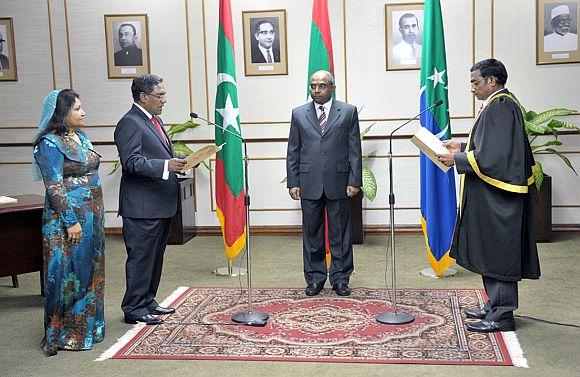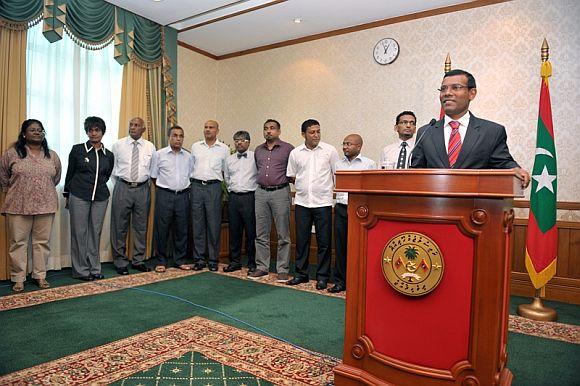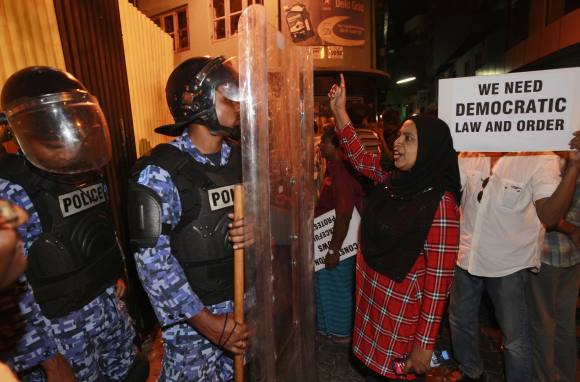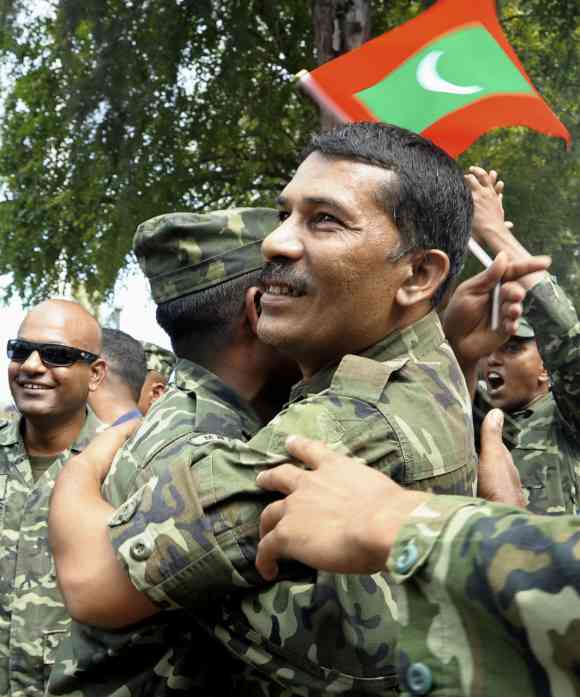 | « Back to article | Print this article |
Mutiny in Maldives: President Nasheed replaced by vice president
External intervention to help Mohammed Nasheed overcome the mutineers would have been inadvisable, and therefore forced him to step down as president, says strategic expert B Raman.
Maldives saw dramatic developments on Tuesday, when President Mohammed Nasheed was forced to step down from office following a mutiny by about 100 officers of the Police and the Maldives National Defence Force, who joined a group of anti-government protesters belonging to the opposition parties.
They have been protesting in the public square of Male, the capital, since January 16 against the arrest of the chief judge of the criminal court on the orders of President Nasheed by the MNDF on the ground that his activities posed a threat to national security.
The protesters and the revolting officers of the police and the MNDF attacked the headquarters of the MNDF, set fire to the office of the ruling Maldivian Democratic Party, seized the local broadcasting/TV station run by the government and issued ultimatums to the president to resign or face an attack on the presidential residence.
Click NEXT to read further...
'I resign because I'm not a person who wishes to rule with the use of power'
The president in a brief statement read out by him in the local Divehi language from the TV station controlled by the revolting officers announced his resignation.
He said in his statement: "I resign because I am not a person who wishes to rule with the use of power. I believe that if the government were to remain in power it would require the use of force, which would harm many citizens. I resign because I believe that if the government continues to stay in power, it is very likely that we may face foreign influences. I have always wished the citizens of this country well, now and into the future. I have made this decision and I wish for your prosperity in this life and the life after."
Vice President Dr Mohamed Waheed Hassan was thereafter sworn in as the president. Following his swearing-in, Dr Waheed spoke on TV. He said he was grateful to the police and the MNDF who had made "great sacrifices" to defend the constitution. He added, "Today is the day the rule of law has been established in the country perfectly. I will not order the police, military or any person to do anything against the law -- I promise it to the public. Everyone will have the protection of constitution and laws."
Dr Waheed also said that Nasheed and his family would receive protection under the law. He further said, "I call upon all political parties, the Maldives National Defense Force, and the public that this is the time to put aside personal hatreds and jealousies, and prioritise to work for the interests of our nation. And I assure that we will work to restore peace and prosperity of the nation, to deliver a harmonious and peaceful living to the people."
Click NEXT to read further...
Trouble started when govt said it planned to reorganise judiciary
The trouble that led to the dramatic developments of February 7 started in January after the government announced its plans to reorganise the judiciary on grounds of its alleged incompetence and inefficiency.
On January 16, Criminal Court Chief Judge Abdulla Mohamed was arrested by military forces and detained at a training facility in Kaafu Atoll Girifushi. The matter was raised by the opposition in the National Security Committee of the parliament.
In statements before the committee, Home Minister Hassan Afeef and Defence Minister Tholhath Ibrahim Kaleyfaanu stated that the judge was not under arrest, and that he was being "supervised to ensure national security".
The defence minister avoided repeated requests of the opposition to explain the reasons for the judge's arrest, claiming that the reasons had been explained in a previous public statement which was aired on the state TV three days after the arrest. Afeef at the time had accused the judge of "taking the entire criminal justice system in his fist", and added that the executive had been compelled to act to protect the constitution.
The defence minister stated that the police had sent a letter to the armed forces on January 16 "requesting assistance to carry out its legal duty under article 71 of the Police Act, stating that the criminal court was not cooperating with police and that as a consequence of judge Mohamed's obstructing police work, the country's internal security was threatened and police were unable to maintain public order and safety."
Click NEXT to read further...
'Current situation can't be compared to the situation in 1988'
The MNDF exercised authority under chapter nine of the constitution and the Armed Forces Act of 2008 to take the judge into custody. He denied that the judge's detention was unconstitutional. Afeef observed that those accused of causing the current unrest and destroying public property were swiftly being released by the judges, thus encouraging more unrest.
The ruling Maldivian Democratic Party (MDP) proposed a bill to amend the Courts Act (22/2010) which would reduce the number of judges on both the benches of the supreme court and the high court if passed.
Following heated arguments between MPs belonging to the ruling party and the opposition in the National Security Committee of the parliament on the arrest of the chief judge, the National Security Committee session was abruptly dissolved and there were violent clashes between the protesters who demanded the release of the chief judge and the government supporters. These violent clashes, which started on the night of February 4, continued on the nights of February 5 and 6 also. On the morning of February 7, about 100 officers of the police and the MNDF joined the protesters and demanded the resignation of the president, forcing him to resign. After the resignation of the president, the arrested chief judge was released.
The current situation could not be compared to the situation in 1988 when there was a threat to internal security due to the intervention of pro-LTTE elements from outside. Finding that his forces would not be able to meet the threat, the then president Gayoom sought Indian assistance from the then Prime Minister Rajiv Gandhi. Indian forces intervened and restored law and order.
The threat to internal security this time was due to violent clashes involving members of the security forces and civilian protesters because of the anger over the arrest of the chief judge. While the resignation of the elected president under pressure exercised by a group of officers of the police and the MNDF, who joined hands with protesters of the opposition, was deplorable, Nasheed himself, who had mishandled the situation by giving rise to suspicion that he was planning to pack the judiciary with his nominees, seemed to have felt that any external intervention to help him overcome the mutineers would be inadvisable. Under these circumstances, the question of any Indian intervention did not arise.



